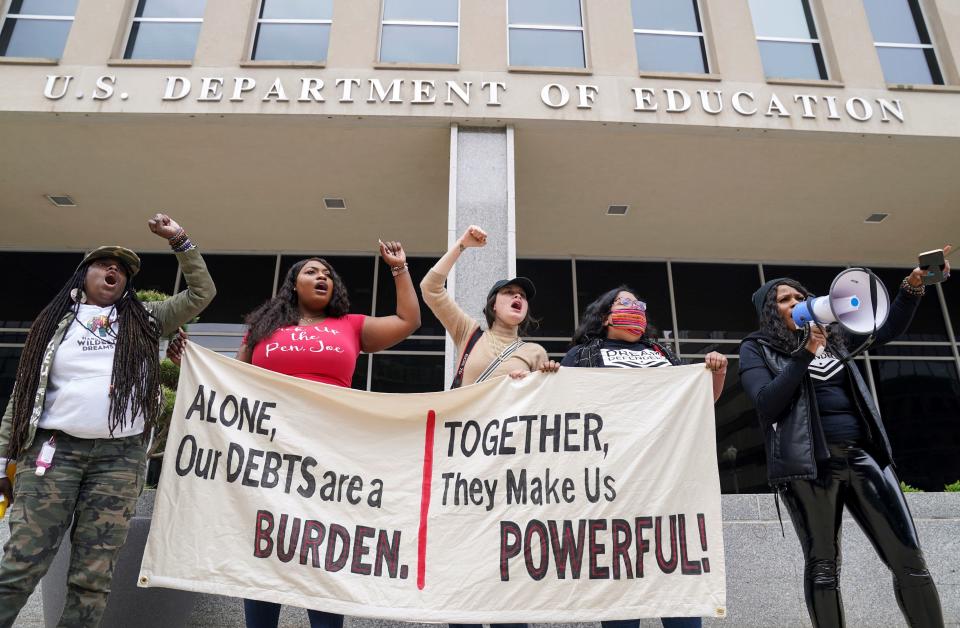Is college worth it? Americans say they value higher education, but it's too expensive for many
Americans on both ends of the political spectrum agree: Earning a bachelor’s degree may help people find good jobs and could improve society, but attending college can be too expensive and time-consuming for working adults. Many say the American economy is rigged in favor of the rich and influential, according to a new poll from USA TODAY and Public Agenda.
The survey found a little more than half of Americans agree that the benefits of a degree outweigh the costs. Younger people, who historically have made up the majority of the college-going population, are dubious of higher education’s value.
Respondents interviewed by USA TODAY say a college education can feel exclusionary and pricey. Others question how effectively a university education helped them find jobs, even if they were happy with their degrees. The survey of 1,662 adults was conducted online from May 3 to 6 and has a credibility interval of 2.9 percentage points for all respondents.

Undergraduate enrollment has fallen by more than a million students in the past two years, in part because of COVID-19 and, more recently, a surging workforce. The nation’s $1.7 trillion student loan debt portfolio continues to balloon.
Among the poll's findings:
About 3 in 4 Americans say it's a problem that employers require a college degree for jobs that don't need them.
About 66% of Americans say colleges are stuck in the past instead of meeting the needs of today's students.
Roughly 83% agree the cost of college makes it difficult for low-income students to get an education.
About 3 in 5 say getting a degree is "too time-consuming and expensive for working adults."
The declining enrollment and poll results signal a disconnect between data that shows Americans who attend college earn more than those who do not and Americans’ interest in pursuing higher education, says Anthony Carnevale, director of the Georgetown University Center on Education and the Workforce.
He says not every bachelor’s degree will translate to increased earnings, but generally they lead to higher wages over a graduate’s lifetime. Those with a bachelor’s degree earn a median $2.8 million in their career, which is 75% more than they would earn if they only had a high school diploma, according to research from Georgetown.
Carnevale says of the 35 million projected new jobs in 2031, 40% will be available to those with a bachelor's degree or higher.
The Pew Research Center found students whose parents have degrees earned more and are wealthier than their peers who are first-generation college graduates. Pew found about 38% of Americans over the age of 25 have a bachelor’s degree, up 7.5 percentage points from 2011.
COLUMN: Four-year degree worth the cost? Americans value education, but government should pick up the tab.
“No, you don’t need a bachelor’s degree to get a good job, but your best shot at a good job is a bachelor’s degree,” Carnevale says. “What you see here is a failure to inform the public.”
Americans want to get a good job without a degree
Nearly 86% of Americans across political affiliations agree “that a college education helps working adults advance their careers,” according to the USA TODAY/Public Agenda poll. Roughly 70% say a college education helps people to become better informed.
Americans don't want to be forced to go to college. About 9 in 10 respondents say, “People should be able to make a decent living without having to get a college education.”
Americans seem skeptical of the value of higher education. About half say the nation’s democracy would be “stronger if more Americans had a college education,” and half say higher education strengthens the economy. Among Democrats, 64% say more college graduates would boost the economy, and 40% of Republicans say so.
Support for a college education has declined in recent years. In 2016, a Public Agenda poll found 46% of respondents said college is a “questionable investment because of high student loans and limited job opportunities.” In 2019, a Gallup poll found half of respondents said a college education was "very important," which was down from the 70% who said the same in 2013.
Though Americans are unsure whether their dollars should go toward a college education, they generally support the idea of others getting a degree. Three in four Americans surveyed in the USA TODAY/Public Agenda poll say, “There would be positive impacts on people’s ability to earn a good living that can support a family" if more people in their state had a college education. A similar amount say a college-educated workforce could improve their states’ ability to attract employers. Seven in 10 Americans agree a college education can help "students become more informed, engaged citizens."
Grant Jenkins, 29, attended Kenyon College, a private liberal arts institution in Ohio. Jenkins, who is based in Texas, says she enjoyed earning her math degree, but she seldom uses the material in her day-to-day job as a data scientist.
“I would probably attribute more of my success post-college to the fact that I came from a relatively high-income family and that my parents have connections than my college degree itself,” Jenkins says.

Pedro Valdez-Rivera, 30, graduated from Brooklyn College in 2013. He volunteers for charitable organizations and works part-time as a muralist in New York City. The biggest benefit of his college education, he says, was the social confidence it provided him.
"From elementary to high school, I was more of an introvert and loner," Valdez-Rivera says. "That school changed my life basically. Otherwise, I'd have other problems I could not control if I stayed stuck as an introverted person."
Enrollment down after COVID-19
The skepticism toward college aligns with declines in college enrollment numbers. Higher education institutions have lost nearly 1.3 million students since the start of the pandemic in March 2020, according to data from the National Student Clearinghouse, a group that tracks college enrollment.
Doug Shapiro, executive director of the National Student Clearinghouse’s Research Center, says those declines initially were probably influenced by the mass adoption of online courses that accompanied the early days of the pandemic. Although the increased availability of vaccines prompted most universities to return to in-person classes, enrollment figures have not recovered, Shapiro says.
The USA TODAY/Public Agenda poll found most Americans look highly upon community colleges for the value they offer. About 60% say these institutions "help students get an education in a timely, cost-effective manner."
Community colleges have been hit hardest by the enrollment declines. Since the start of the pandemic, community colleges have lost 827,000 students and saw a nearly 8% decrease in the spring 2022 semester compared with the same semester last year.

A bright spot for these colleges? More students enroll in skilled trade programs, such as construction, transportation and material moving, a sign that students are responding to the labor market, Shapiro says.
The USA TODAY/Public Agenda poll found the majority of Americans across party lines are skeptical of the value of their “most prominent and selective state university."
One in five Americans say these institutions help students get a timely and cost-effective degree, and one in four say they are "worthwhile investments for students and their families."
Private universities and public four-year flagships overperform compared with other schools, drawing in students because of the prestige associated with attending a selective institution.
“The sense of competition for those top slots has never been higher,” Shapiro says.
Americans say college can be too expensive
A large majority of Americans say the cost of college keeps many from a degree. The USA TODAY/Public Agenda poll found 83% of Americans agree that the "cost of attending college makes it difficult for low-income students to get a college education."

Michael Lamm, 64, who participated in the survey, says many smart people from low-income families “could contribute to the world immensely and maybe change it” if they could afford a college education.
Lamm served in the Navy for two decades, and his service entitled him to the GI Bill, a federal benefit that covers much of the cost of a college education for veterans. He says he tried to take courses but realized he could not sit out of the workforce for that long.
Lamm, who owns a security company and is the branch manager of a staffing agency, says he would consider going back to finish his degree if college were free, but he would not pay for it. He encourages his two high school children to consider military schools. That would mean some military service, he says, but also a debt-free education.
Though many Americans say price keeps some from a higher education, they disagree on how much race affects college access.
About 70% of Democrats agree that “racial discrimination makes it more difficult for people of color to get a college education.” Half of independents and 1 in 4 Republicans say the same. Black, Latino and Asian American respondents are more likely than their white counterparts to agree that race could limit someone's access to higher education.
Many Americans support student loan forgiveness
Democrats and Republicans are split on the question of widespread loan forgiveness.
About 80% of Americans say student loan debt is a problem, and about 3 in 5 are in favor of “forgiving a significant portion of government student loans for college graduates who have excessive debt.” About 4 in 5 Democrats support student forgiveness, and roughly 40% of Republicans do.
Popular solutions to lowering the cost of college and paying back student loans include states offering “interest-free student loans,” which are backed by roughly 75% of respondents. About 65% favor making community college free. A little more than 60% favor increasing taxes on Americans making more than $500,000 a year to make public institutions more affordable.
President Joe Biden's plans for free community college have been scuttled, but he said he is considering some form of mass debt forgiveness. The administration has yet to say who would be eligible for that forgiveness or how much would be discharged. On the campaign trail, Biden proposed discharging $10,000 in student loan debt per borrower.
Payments on federal student loans have been frozen since March 2020. That moratorium is scheduled to last through August and is likely to be extended through the midterm elections in November.
Jenkins, one of the poll respondents, didn’t borrow to attend college, but she says she would be in favor of loan forgiveness.
“I support anything that helps working people,” Jenkins says. “But $10,000, it’s not going to change things. People are going to accumulate debt again if we don’t do free college.”

This article originally appeared on USA TODAY: Cost of college, student debt has many Americans questioning college

